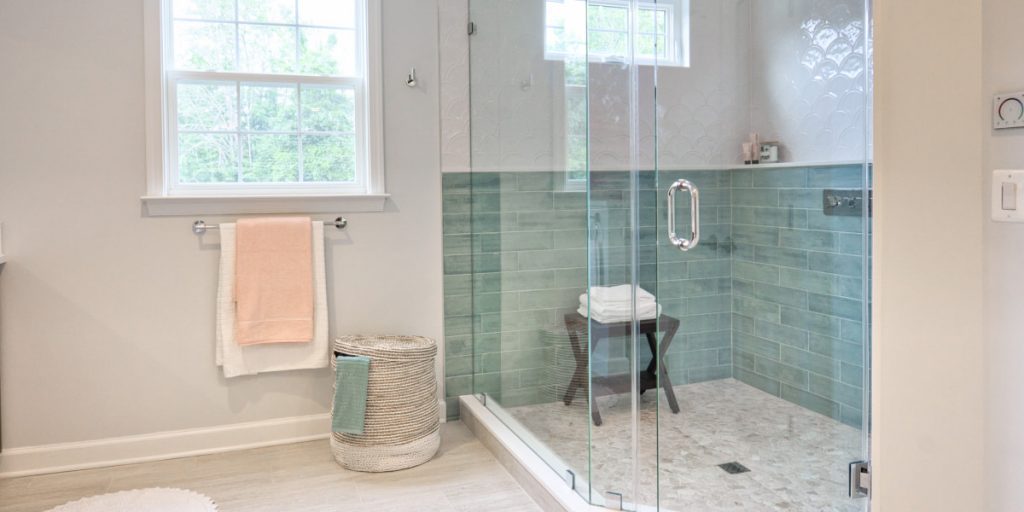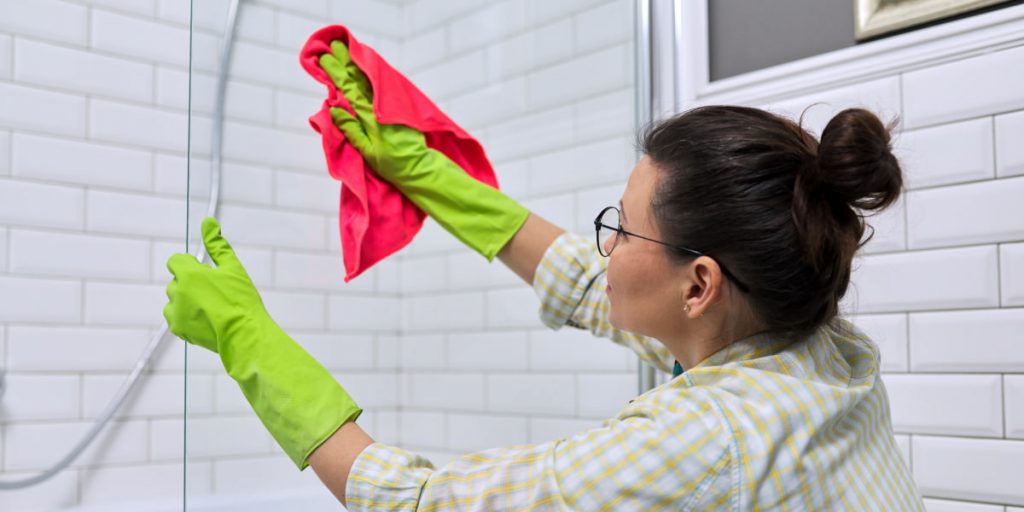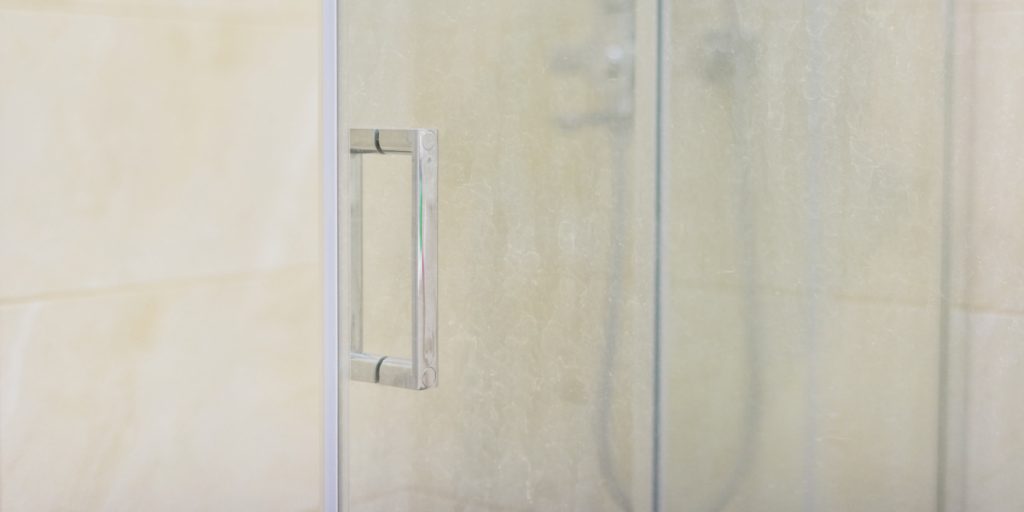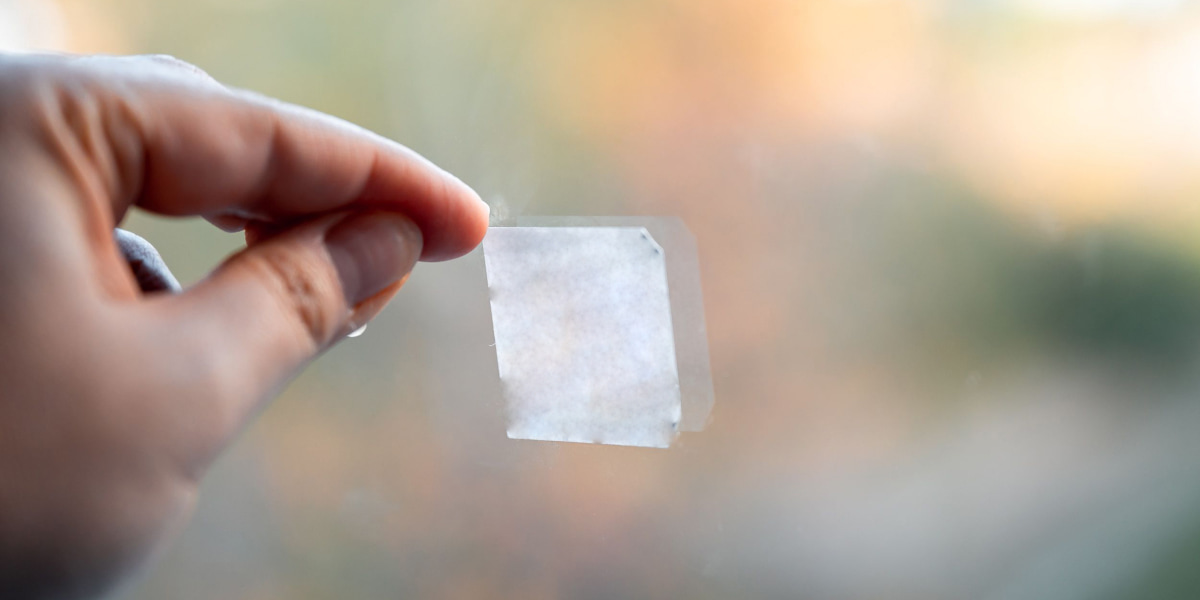Published on January 24th, 2023
Last updated on February 3rd, 2023
How To Remove Hard Water Stains On Glass: Methods With A Tip Guide

Beautiful and shining glass in your home is a sign that you are a great host. However, even the best can have trouble keeping their homes clean. In the case of glasses, this can be due to many reasons for the appearance of stains.
Stains can appear due to shampoo, tap water, soap or dirty fingers. Unfortunately, removing water spots on glass is not as easy as we wish. Due to strong water stains, glass becomes ugly and repels the eye. If you encounter such a problem, we will help you solve it.
Our article will tell you about what materials you need for reflecting surface cleaning. We will also show you step-by-step instructions on how to get rid of hard water stains on glass. And besides, here are a couple of tips on how often you need to wash your glasses to keep them clean. Read our article to the end, prepare the soapy solution. And let’s make your reflecting surfaces shine together.
Equipment You Need for Getting Hard Water Stains off Glass

To effectively remove water stains on the glass, you’ll need a selection of cleaning supplies. These may include:
- Squeegee. A squeegee is a useful tool for wiping away excess water. And it’s great for cleaning solutions from your windows. And it leaves them streak-free and sparkling clean.
- Microfiber cloth. Microfiber cloths are soft, lint-free, and highly absorbent, making them perfect for wiping down windows and other reflecting surfaces without leaving behind streaks or lint.
- Soft-bristled brush. A soft-bristled brush can gently scrub dirt and grime from window frames and corners. And you don’t need to scratch the glass.
- Old toothbrush. An old toothbrush can be handy for getting into tight corners and crevices. It will remove hard water stains from the glass.
- Small bowl. You’ll need a small bowl for mixing up any homemade cleaning solutions. And it’s also great for holding water or other cleaning products.
- Rubber gloves. Wearing rubber gloves can help protect your hands. It will be good for harsh chemicals or hot water while cleaning.
- Eye protection. Wearing eye protection is important to protect your eyes. It can be splashes or spills while cleaning.
- Old towel. An old towel can be useful for wiping down window frames. And it’s great for soaking up any excess water or cleaning solution.
The Detailed Guide on How to How to Get Rid of Hard Water Stains

For every housewife, hard water spots can be a big problem. Stained glasses do not attract the eye and are disgusting. And these stains are most often caused by minerals like calcium or magnesium. It makes these stains difficult to remove.
However, with the right approach and skill, you can easily remove such stains in no more than 10 minutes. Here is a detailed guide on how to remove hard water stains from your glass:
- Gather all the necessary materials. To do this, you can read our small list of all the necessary materials above. In general, cleaning products and sponges are cheap products. And you can buy them in almost any store.
- The first step in cleaning is washing the reflecting surface with low-hardness water. This will help remove spots on the glass and prepare it for further water cleaning.
- Next, you need to mix a special solvent. That would be what you need to remove hard water stains. It will help dilute hard water and dissolve mineral deposits. Choose products specially formulated for this purpose. They contain milder ingredients that will not damage the surface.
- Mix the product according to the instructions on the package. And apply it to the surface using a special product or a soft cloth. Leave the product for a while so that it can dissolve the mineral deposits.
- After the agent has been working on the reflecting surface for the specified time, you should rinse the spot with water of low hardness to remove the agent and dissolve mineral deposits.
- Next, wipe the surface with a dry cloth and, if necessary, repeat the process.
Proper care is important not only for its appearance. It is also for your comfort and safety. Hard water stains can reduce the transparency of the material. And it interferes with indoor lighting and makes it difficult to see outside. Besides, improper care can damage the surface. And this increases the risk of injury and the need to replace the reflecting surface.
How Often Should I Clean Glass in My House?
The frequency of removing water spots on glass depends on a few key factors. How often you should clean reflecting surface depends on:
- The type of material.
- How dirty it becomes.
- Your personal standards for cleanliness.
Let’s consider each type of glass in your house:
- For windows, the frequency of cleaning may vary. It can be from a few weeks to once a month, depending on where you live and the weather conditions. If you live in an area with high levels of dust or pollution, or if your windows are particularly dirty or streaky, you may need to clean them more frequently.
- Mirrors should be cleaned at least once a week. They tend to become smudged with toothpaste, makeup or other care products. If you have a large mirror or multiple mirrors in your home, you may want to clean them more often.
- Shower doors and tiles should be cleaned at least once a week to prevent the buildup of soap scum and mildew. If you have hard water stains or calcium deposits, you may need to clean these surfaces more often to keep them looking fresh and clean.
- Glass tables and other surfaces should be cleaned as needed based on how dirty they become. If you have young children or pets that tend to make a mess, you may need to remove hard water stains from glass more frequently.
How to Remove Hard Water Stains on Glass: How Much Does Glass Cleaning Cost?
The cost of getting hard water stains off glass can be different. It depends on many factors, like the size of the area, the type of surface, and the location of the property.
Here are a few factors that can affect the cost of cleaning:
- Size of the area. The larger the area of surface, the more it will cost.
- Type. Some types of reflecting surface are more difficult to clean than others. They are:
- Tinted.
- Mirrored surface.
- They may require specialized cleaning techniques or products. This can increase the cost of the cleaning.
- Location. Reflecting surface cleaning services may charge more for properties that are in hard-to-reach or high-rise buildings.
- Frequency of cleaning. The frequency of cleaning can also affect the cost. For example, cleaning the surface on a weekly or monthly basis may be less expensive.
In general, you can expect to pay between $50 and $100 for glass cleaning. Services include standard-sized home or office cleaning. But the final cost will depend on the specific factors listed above. It’s always a good idea to get quotes from many companies to get a sense of the going rate in your area.
Summary
As you can see, removing water spots on glass is a fairly simple procedure. But it needs a lot of your effort and attention. When working with a mix that removes hard water stains, be careful. And don’t allow the product to come into contact with the skin and eyes. Also, to keep your glass always shining, do regular stain cleaning.
FAQ
How to remove hard water stains on glass?
Mix a solution of equal parts water and vinegar. Then dip a cloth or sponge into the solution and use it to scrub the hard water stains on the glass. Rinse the glass with clean water to remove the vinegar solution. And finish by drying the glass thoroughly with a clean, dry cloth to prevent water spots.
What removes hard water stains?
You can use:
1. Vinegar.
2. Baking soda.
3. Lemon juice.
4. Commercial hard water stain removers.
5. Abrasive materials.
How to prevent the appearance of hard water stains on the glass?
To do this, you need to understand why stains appear on your glass at all. Most likely in your house the water is saturated with minerals. Therefore, it is best to immediately wipe such water from the surface of the glass.
Are cleaning products dangerous for children?
If individually, natural cleaning products are generally safe for any age. But their mix can lead to bad consequences. Always protect children from such products and keep them out of their reach.


